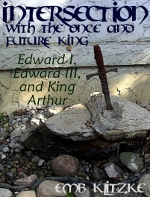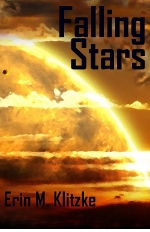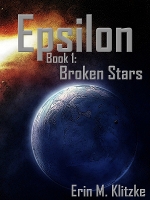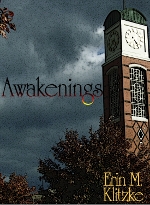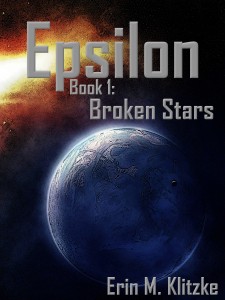Genesis (or why I do what I do)
A few weeks back at Desert Nights, Rising Stars at ASU, the inevitable question that arose whenever I mentioned that I had taken the self-publishing/indie publishing route for my work was “How did you do it?” or “Where did you learn to do that?”
The answer is pretty simple: the Internet.
My road started comparatively late for a lot of people who have been doing this for a long time–I didn’t really start down the indie pub route until 2011, so by that time there was a wealth of resources for me to draw from. Why is that? Because there were a lot of blogs out there from some fairly big names (well, okay, I had heard of several of them, at least, but I’m a huge nerd) that were talking about it.
Back in early 2011, I was screwing my head back on straight after the long, arduous and abruptly truncated work of writing and defending my Master’s thesis (I suffered every graduate student’s nightmare–my advisor passed away in the middle of my project and then all of a sudden I realized I did not have very much time to finish under my new team–six weeks from very rough draft to finished 200-page historical study isn’t something I’d wish on anyone). A friend from my fan fiction days asked me if I’d been following Michael Stackpole’s blog lately and I admitted that I hadn’t.
So in a lot of ways, it’s all Trevor’s fault that I’m doing this now.
At the time, in March 2011, Stackpole wrote the first of his “House Slaves” series on the changing publishing industry (he’d later catch some heat for this, but I still think that analogy is good and works pretty well if you read all of it in the context and spirit in which it was written). My road began right there, as I started to realize how much I didn’t know about the publishing industry that I thought I had and how much the world was changing.
Now, a second thing happened in March of 2011–I got my first e-reader, so the whole ebook publishing world had suddenly become very, very interesting. If you’re thinking about getting into the world of self/indie publishing and digital publishing and you’ve never played with an e-reader or e-reading software, I’d suggest very strongly that you at the very least borrow one from a friend or relative so you can play with it and learn how reading on one of these devices changes the reading experience (this is especially important later, when you get ready to format your work for publication–you have to beat least vaguely aware of how your text will behave on an e-reader or smartphone screen, since it’s not static as it would be on a sheet of paper).
For me, getting my first e-reader (which I still have, use, and love) and my sudden realization of how quickly the publishing world was changing was a double-whammy and heavily influenced my decision to investigate independent options.
The best advice before I get into the how instead of the why:
Self/Independent publishing is not for everyone. Do your homework before you make your choices and make the choice that’s right for you.
End of disclaimer. Here’s the first part of how I learned to do what I do now.
Recommended Reading
As I said above, the main place I learned how to independently publish my work was from the internet. When people say that you can find pretty much anything you want to (or really, really don’t want to) on the internet, they’re not lying. There are a ton of websites out there that talk about the publishing industry in general and indie publishing in specific.
You may notice that I’m using self and indie publishing pretty much interchangeably. That’s because in some ways, to me, they are. Some folks would disagree with this assessment, but that’s their opinion. There are some people who define indie publishing as small-press publishing (rather than traditional “big” publishing with folks like Random House, Simon and Schuster, etc.), and that’s fine. For my purposes, however, independent and self publishing are individually based or based in very, very small houses (talking only a few authors here–WMG Publishing is a good example of what I’d consider an “indie publishing” house).
In order to learn a lot of what I’ve learned, I did a lot of research and read lot of blogs. Below is a list of what I recommend anyone thinking about going the indie pub route should start reading and start reading fast.
In no particular order…
- The Passive Voice – Passive Guy (a lawyer by training whose wife is the writer) blogs about publishing in all forms with a focus largely on the indie end of things and how publishing is changing and changing fast.
- Kris Writes: Business Rusch and Freelancer’s Survival Guide – Two different sections of Kristine Kathryn Rusch’s blog. I have learned quite a bit from her guides.
- Dean Wesley Smith: Think Like a Publisher and Killing the Sacred Cows of Publishing – Two different sections of Dean Wesley Smith’s blog. I have learned quite a bit from his work in conjunction with his wife’s.
- StormWolf.com (Michael Stackpole)’s essays on publishing – The link is to the category where he talks the most about publishing independently and the changes and challenges facing the publishing industry at large.
- A Newbie’s Guide to Publishing – JA Konrath’s blog is not for everyone, but I’ve learned a ton just by reading this.
- The Book Designer – This blog will teach you a lot about the more technical and aesthetic ends of book design, both ebooks and print editions.
- The Smashwords Blog and Smashwords Style Guide (ebook) – If you want to do anything on Smashwords, I would highly recommend reading the second because it will help you from the outset to make sure that you’ve got a neatly formatted ebook. The blog often has information about ebook sales figures and trends.
- Be the Monkey (ebook) – This ebook was written a while back as a series of blog posts by JA Konrath and Barry Eisler that they later published as an ebook. It’s a must-read if you want to begin to understand the shift in publishing and why the ebook revolution is such a boon to new (and old!) writers.
- Galley Cat – Pretty cool newsfeed on publishing.
I am sure that there are several others that I’m missing at this time, but these are the sites that I go back to time and again and the books that I go back to time and again while I continue to move forward with my writing career.
Next week, I’ll go into more depth on ebooks–why they’re important and where and how to publish them.

